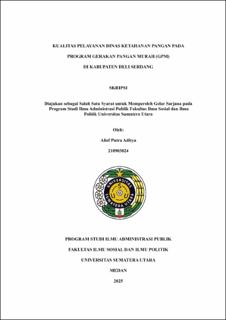Kualitas Pelayanan Dinas Ketahanan Pangan pada Program Gerakan Pangan Murah (GPM) di Kabupaten Deli Serdang
The Quality of Service of the Food Security Office in the Affordable Food Movement (GPM) Program in Deli Serdang Regency

Date
2025Author
Aditya, Alief Putra
Advisor(s)
Rangkuti, Zoraya Alfathin
Metadata
Show full item recordAbstract
This research is motivated by the suboptimal quality of public service in the implementation of the Cheap Food Movement Program (GPM), particularly in Deli Serdang Regency. Although Deli Serdang Regency is one of the regions with a rice surplus in North Sumatra Province, the GPM program is still implemented to maintain food price stability and control inflation, especially ahead of National Religious Holidays (HBKN). However, in its implementation, various issues were found such as the inconsistency in rice distribution, lack of information to the public, and long waiting times for realization, which indicate weaknesses in service quality.
This study aims to analyze the quality of public services provided by the Deli Serdang Regency Food Security Office in the implementation of the GPM Program based on five service quality indicators according to Fitzsimmons, namely: reliability, tangibles, responsiveness, assurance, and empathy (Fitzsimmons in Nashuddin, 2016:132). The approach used is a descriptive qualitative approach. Data collection techniques were carried out through observation, in-depth interviews, and documentation, using purposive sampling to determine informants consisting of officials from the Food Security Office, village officials, and the program's beneficiary community. Data were analyzed using the interactive model of Miles and Huberman, which includes data reduction, data presentation, and conclusion drawing.
The research results show that the quality of service in the implementation of GPM has not been optimal. The reliability indicator is still weak because the distribution of rice does not meet demand and the implementation time is limited. The tangibles indicator shows a lack of information facilities and socialization media. The responsiveness indicator is also not optimal because the administration and distribution processes are slow. On the other hand, the assurance and empathy indicators are rated well; the officers provide polite service, prices are communicated openly, and there is attention to the community's condition during food price surges. In conclusion, the GPM program in Deli Serdang needs improvements in the aspects of reliability, responsiveness, and public communication to achieve effective and equitable public service.
Collections
- Undergraduate Theses [1957]
